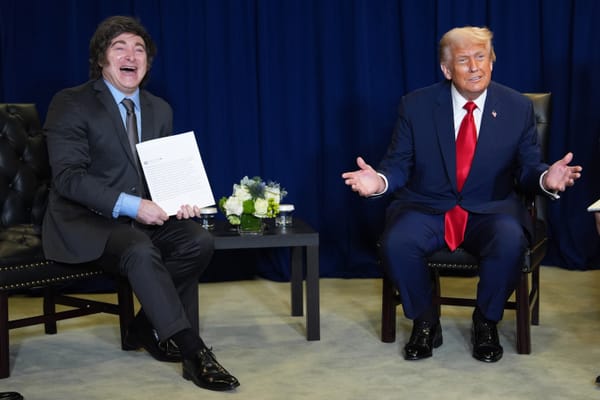On Monday, Treasury Secretary Scott Bessent signaled that the Trump administration is committed to doing what is necessary to stabilize Argentina amid fears of another inflationary spiral. “All options for stabilization are on the table,” he declared “including swap lines, direct currency purchases, and purchases of dollar-denominated debt” held by Argentina. In response, Argentine President and Trump ally Javier Milei thanked Bessent for his “unconditional support.” The next day, at a meeting with Milei at the United Nations, President Trump agreed to help his Argentine counterpart, but downplayed talk of a bailout, likely due to pushback from the MAGA base.
While the exact scope of US assistance remains unclear, one thing is certain: Far from solving Argentina’s woes, Milei’s libertarian experiment has failed to address the root causes of the crisis, ironically creating the need for intervention by a foreign state.
Since assuming the presidency in December 2023, Milei has been lauded by Wall Street and conservative pundits for taming inflation with a program of fiscal austerity. But in recent weeks, the self-described anarcho-capitalist lost favor among investors, leading to a full market panic. Setbacks including a corruption scandal involving the president’s sister, congressional gridlock, and a bruising defeat in provincial elections in Buenos Aires led to predictions that the left-wing Peronist bloc would prevail in next month’s congressional midterms.
With all of this in the background, the Argentine peso has lost almost a third of its value since August, prompting the central bank to sell more than a billion dollars of its scant foreign reserves to prevent another spike in inflation. Argentine markets and the peso rallied in response to Bessent’s comments, but the White House’s prospective bailout will only put the crisis on hold.
“At the root of Argentina’s woes is the decision to tie its currency’s fortunes to the US dollar.”
At the root of Argentina’s woes is the decision to tie its currency’s fortunes to the US dollar. For decades, the peso has been pegged to varying degrees to the greenback—a decision which created a parallel economy in foreign currency and has resulted in the peso’s perpetual overvaluation. As a result, the peso has been prone to periods of spectacular collapse depending on the size of the central bank’s foreign reserves, investor confidence, and the country’s dollar-denominated debt.
The logical solution is to end the peg to the dollar. Unfortunately, this would entail a collapse in the peso’s nominal value and a subsequent spike in inflation. This was what happened when Milei took office. The administration began a slash-and-burn campaign of cutting the state and allowing the peso to float. As in recent weeks, the value of the peso collapsed. Worse, the government’s fiscal austerity produced a catastrophic depression. Then the libertarian president resorted to the same tool that so many of his predecessors—Peronist or otherwise—have used to control inflation, and restored the peg to the dollar. Inflation subsequently fell from almost 300 percent annually in 2024 to around 30 percent today.
Like his predecessors, Milei has taken credit for reducing inflation despite failing to address its underlying cause. Just months into his presidency, the peso recovered and even exceeded its prior peak, leading to a bizarre situation where half the country is plunged into poverty due to government spending cuts while affluent Argentine professionals flock to Brazilian beaches thanks to the favorable exchange rate.
Trump’s prospective bailout would mean that the Milei administration can continue to prop up the Ponzi scheme that is Argentina’s economy. The perennial peg to the dollar will continue to inflate the peso far beyond its worth, causing continued distortions and leaving Argentines at the mercy of further panics from investors. Unwilling to decouple the peso from the dollar for fear of stoking inflation and losing the presidency, Milei will continue to resort to external injections of foreign currency in order to keep his country afloat. His government already brokered a $20 billion loan from the IMF in January, much of which has been depleted defending the peso.
While bailing out his ally is at odds with Trump’s ostensible America-First stance, it squares well with the administration’s increasingly neoconservative geopolitical aspirations. The White House has lately done everything in its power to alienate vital partners such as India, Brazil and Colombia, all of whom subsequently deepened ties with Beijing. Argentina, conversely, has made a concerted effort to court the Trump administration, offering moral support for Washington’s wars in Europe and the Middle East as well as its military and economic belligerence against Cuba and Venezuela.
If and when the Peronists return to power, they will be far less likely to offer unconditional support for the Northern hegemon. For the moment, Milei will have to beg his American ally for a big, beautiful bailout.
